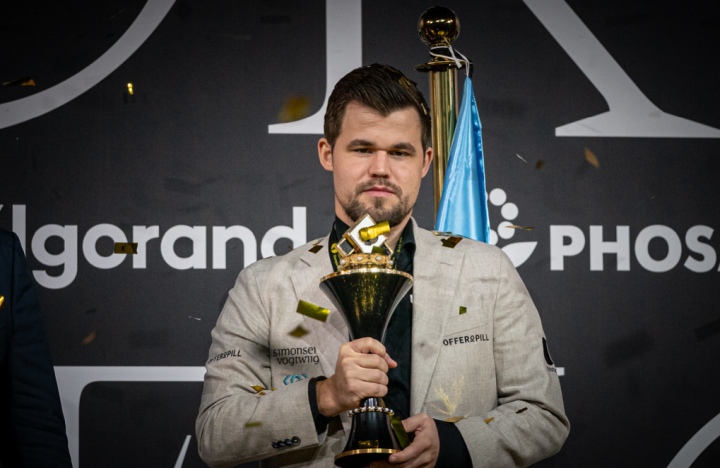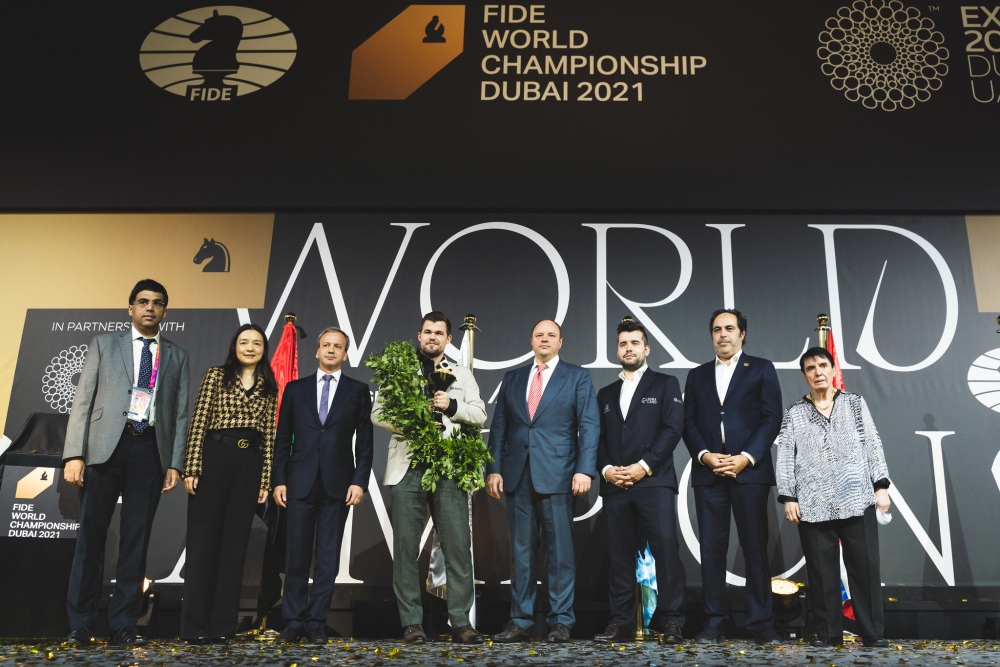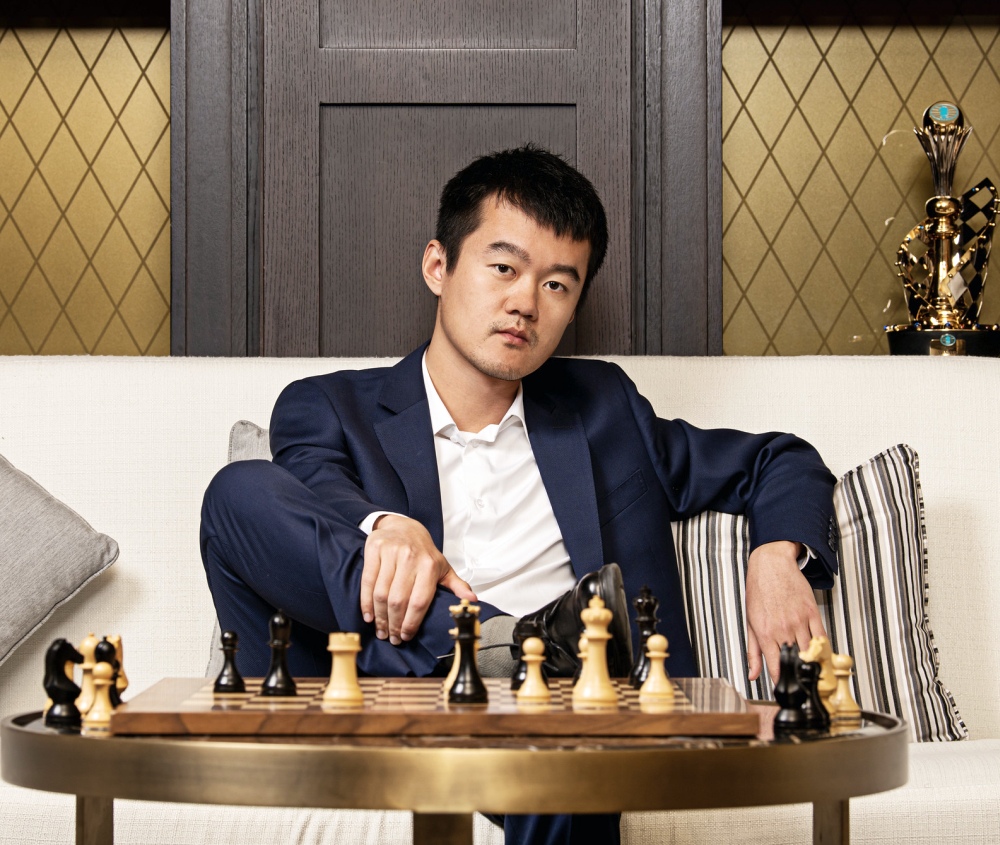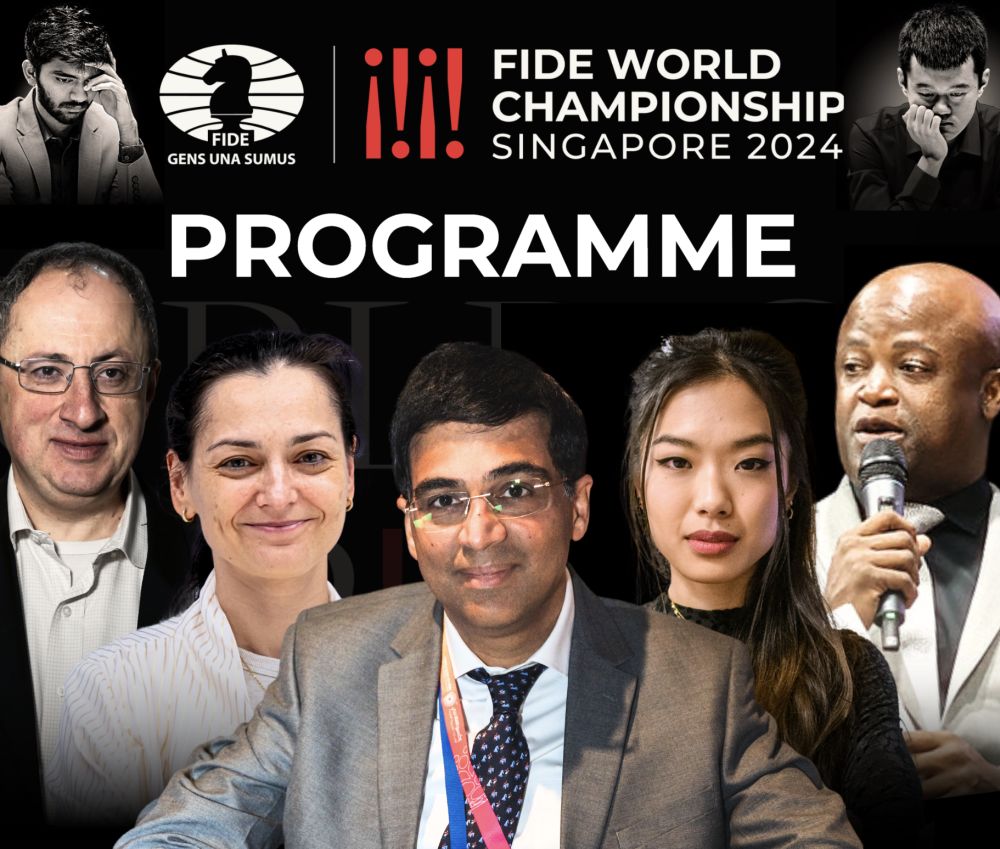
Fraying nerves
The players arrive daily for the world championship at the rear of the South Hall of the Dubai Exhibition Centre in privately driven vehicles. Their trip must be timed to avoid any possible traffic delays and arrive comfortably, rather than overly, in advance of the start of play.
Today, for the 11th game of the FIDE World Championship, challenger Ian Nepomniachtchi was the first to turn up, emerging from a black van, earbuds in place, with a few members of his team, including his girlfriend Snezhana Fomicheva, and manager, grandmaster (GM) Sergey Janovsky.
The Magnus Carlsen delegation was next, with a customary wait in the car before emerging to march past the various cameras assembled. The champion was accompanied by his customary duo, Danish GM and long-time trainer Peter Heine Nielsen, and ‘hype man’ and podcast partner Magnus Barstad.
Feeling at home
Carlsen was the first player to very clearly prioritize a sense of calm and harmony for these long, gruelling title matches, making sure his delegation is full of family and friends and scattering analytical assistants remotely around the world’s time zones so that preparation could be done around the clock.
Nepomniachtchi hasn’t visibly taken this approach quite so far, but his companions today also hint at the same kind of emphasis, his manager and primary trainer are both figures with a long and trusted history with the challenger.

Down the stretch
The ceremonial first move was made by Algorand Ambassador Mr Adi Mishra - Algorand being the official blockchain partner of the FIDE World Championship. The challenger reverted to his favourite first move, 1.e4, changing the complexion of the game with his third move, opting for the Italian rather than Spanish.
Experts were not thrilled with this deviation since the previous Nepo white game, which started 1.c4, had offered more early tension. On the flip side, the Italian was viewed as a way to keep more long-term play than the Spanish, which featured in the challenger’s first four white games.

More bafflement
Once again Carlsen methodically neutralized any danger and aggressive potential in the position, and with possibly his last white game evaporating, Nepomniachtchi once again ‘tilted’, choosing a horrific move that destroyed his position and exposed his king to the deadly attack, rather than acquiesces to the logical sterile draw that was looming.
The following moves eloquently illustrated what a mental pressure-cooker the world championship is. Despite a huge lead and an overwhelming position, the proximity of his fifth world title affected the champion, and after missing a fairly simple kill, Carlsen allowed his edge to dissipate greatly – though experts still expected him to convert it in the end.
The champion played the technical phase at his usual standard, and although his path to a win was narrower, he navigated to it smoothly. After 49 moves, Nepomniachtchi resigned from the game and his challenge to the throne.

Post-game reactions
Carlsen was relatively subdued after the game, saying it was ‘hard to feel great joy when the situation was so comfortable, to begin with.’ He said that overall he was very happy with himself and proud of his performance in the pivotal marathon sixth game, where he took the lead.
Nepomniachtchi’s refrain about the match was that he didn’t feel it had come down much at all to chess and that his task now was to examine how other factors influenced his error-filled collapse in the second half of the match and try to understand and eliminate what happened.
Carlsen was asked at the press conference what he thought helped him dominate the match: “In simple positions, I make very few mistakes. A few times, the position was very complicated, we both made mistakes, but he made the last one.”

Match summary:
Magnus Carlsen, Norway, completes his fifth successful world championship match, winning his Dubai title defence 7½-3½ versus Ian Nepomniachtchi.
Looking back, the duel divides neatly into three segments. The first five games, with challenger Nepomniachtchi having the advantage of white in three of them, were all drawn, but were full of fight. An early pattern emerged with Carlsen willing to sacrifice a pawn in the opening of the game to gain active and imbalanced play.
The most exciting clash in this segment was game two, where Carlsen appeared to seize an opening advantage of surprise and attack, but Nepomniachtichi’s resourceful defence turned the tables and forced larger material sacrifices. The champion managed to create enough pressure and even regained a slight initiative after some slightly sloppy play from the challenger.
The next three games were less eventful, but in the fifth Nepomniachtchi found a way to apply safe yet unpleasant pressure but frittered away his chances with one uncharacteristically hesitant move.
Act two
One could arguably sum up the entire match by mapping, examining and re-examining the twists and turns of the marathon sixth game. The longest ever played in a title match and about three times longer than an average tussle, both sides did their utmost to keep fanning life into a potentially dull position.
The advantage switched hands several times as the game came to its first climax in the race to reach move 40, Carlsen with very little thinking time down the stretch, and with Ian eventually joining him, having only five seconds left as he made his 40th.

Despite the efforts and drama, the game seemed headed to another deadlock, but a hasty lapse of concentration landed the challenger under lasting pressure. Although a machine might find the defensive task facing Nepo straightforward, for a human, it was certain hours of torture against a specialist.
Past midnight and after nearly eight hours of play, a title match game ended in a decision for the first time since the 2016 bout in New York. Carlsen had broken through, largely on determination and willpower, but also on his unique ability to minimize error and maximize pressure.
Act three
Game six left its mark on both players for days, but it was a disappointed challenger that had the most trouble coping with it. A notoriously moody player, Nepomniachtchi now seemed to completely lose focus after a solid start with several missed chances. Unable to buckle down and regroup, the match was, for all practical purposes out of reach after a pair of horrific blunders in games eight and nine.
First, Ian blundered a pawn after drifting from safety to slight pressure as black, then lost a full bishop trying to mount his comeback with the white pieces. Perhaps the most painful game of the match, Nepomniachtchi applied early pressure on the board and clock in game nine, but as Carlsen neutralized the position, the challenger switched off again, completely overlooking danger and immediately getting a lost game.
Exactly what moment was the final straw only Nepomniachtchi can say, but once the challenger’s disappointment threshold was reached, he seemed unable to play with any focus, a deadly state of affairs against the ruthless and long-reigning champion. The 11th and final game was at least as baffling as the other losses by the challenger.

FACT SHEET, Game 11, FIDE World Championship:
White: Ian Nepomniachtchi
Black: Magnus Carlsen
Result: 0-1
Match score: 3½-7½
Game length: 49 moves
Opening: Italian game
Trivia: The Italian is a rare sight in the world chess championship, and the position after 3 moves each was last seen at this level in 1892.
Text: Jonathan Tisdall, Press Officer press@fide.com
Photo: Eric Rosen and Niki Riga
Official website of FIDE World Championship Dubai 2021














